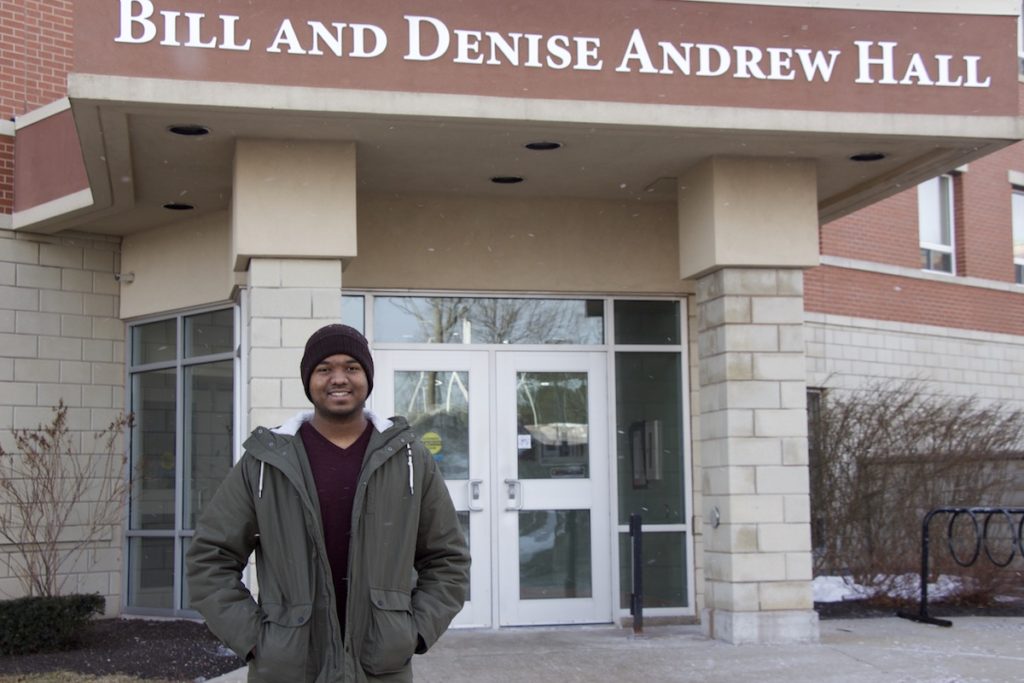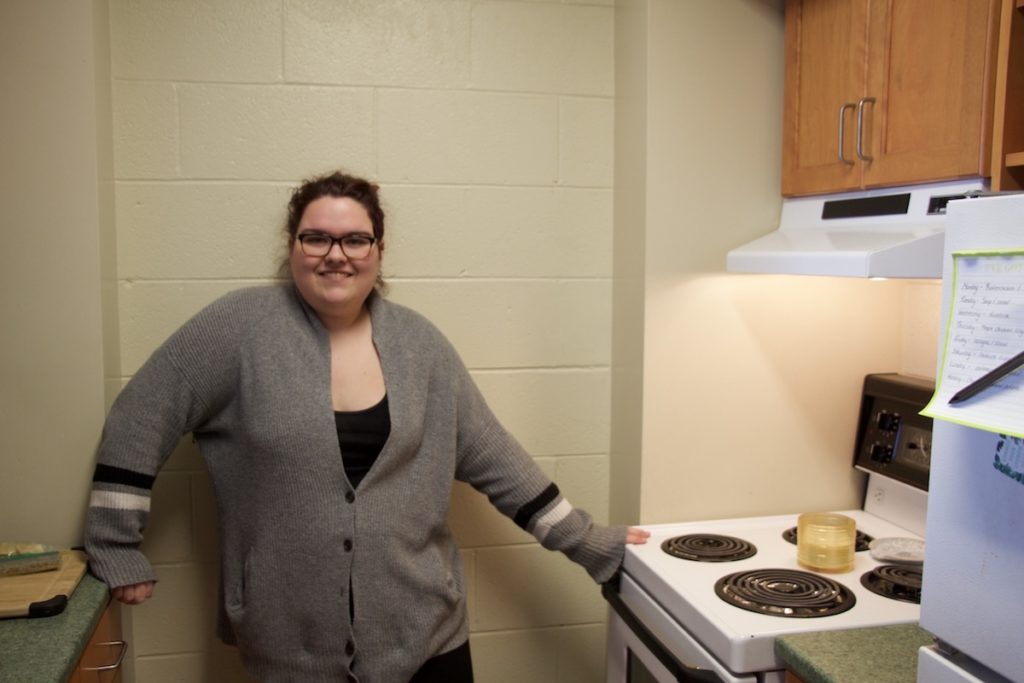Costly meal plans and lack of housing variety plague students
By: Tony Davis

Brian Affouan stands outside Bill and Denise Andrew Hall, the campus residence where he is staying for his first year at UPEI. Next year he hopes to move off campus. (Tony Davis)
Brian Affouan moved to P.E.I. from Mauritius to study computer science at the start of first semester.
When Affouan was coming to study he thought living on campus would be a good idea because it set his parents mind at ease.
“It was a major reason I chose UPEI. I got housing and the meal plan secured for first year and very early. That was very important for my parents because I have no relations here.â€
His parents knew he would have a meal and a place to stay. It was a good move for his first year, he said.
Haley-Lynn Jardine is another first-year student living on campus at UPEI.
She moved from New Brunswick to P.E.I. to study Journalism at Holland College and is continuing her education at UPEI.
Last year, she stayed on campus at the college and has decided to do the same at UPEI but she isn’t staying in Andrew Hall like Affouan. Jardine only considered one residence, Blanchard Hall, because it was the only residence without a mandatory meal plan.
“I didn’t want to have to go from Holland College where I had a kitchen where I could actually make food to have to go spend another couple thousand on a meal plan if I was to stay in Andrew.â€
In November of 2018 the province announced a new 260-bed residence would be coming to UPEI, a $25-$30 million project funded by the government and the university.
Before moving forward on the project there are a few things to consider when looking at current campus living.
The cost of meal plans is turning stomachs
Living on campus is already costly.
A two to three bedroom suite in Andrew Hall costs students $6482 for the academic year.
Add to that a meal plan, which is mandatory for two of UPEI’s three residences, and students are looking at approximately $10,928 in living expenses from September to May.

UPEISU President-elect Emma Drake speaks at a debate night at the Fox and Crow. (Tony Davis)
Emma Drake is the Vice President Academic and External and President-elect for the UPEISU. She has been investigating issues with current residences considering the new 260 unit has been announced.
“If you are looking at the cost of the meal plan it is definitely a big chunk of the sum that you have to pay,†Drake said.
Making the meal plan optional would allow people from other cultures to find food they might be used to instead of being limited to the options at the dining hall.
“I know from a more cultural perspective if you are coming to UPEI from the Bahamas and you arrive to UPEI and all they serve is spaghetti and caesar salad all the time and maybe you want something from back home, you can’t because you don’t have the option to utilize a kitchen,†Drake said.
Finding food similar to home was a worry for Affouan, but he is able to get what he needs through various options at the dining hall, he said.
“It is quite expensive but in a way for me it’s practical like when you come from a different place for example.â€
However, it’s not quite the same as home. Affouan is looking to get rid of his meal plan next year.
What he is eating is not what he would eat ideally. Most people who live on campus decide to move the next year, Affouan said.
“Buying groceries and cooking for oneself is definitely cheaper.â€
The average Canadian individual spends between $200 to $240 a month on groceries, a five-day meal plan in Andrew Hall will have you forking over two and a half times that amount.
Now that Affouan has been living on P.E.I. for a full academic semester, he has gotten used to the community, and he knows where to get the things he likes to eat, he said.
“Now I know where I can buy my things, how to cook it, it is way easier for me. That is why moving off campus is a better choice than continuing to live on campus which is more expensive.â€
What other options do you have?
Affouan is not alone in wanting to leave campus.
Though Jardine is happy she didn’t have to purchase a mandatory meal plan, she still doesn’t want to live on campus. She tried to find a place off campus before deciding to stay in Blanchard Hall.
“There wasn’t a lot of places both nice and affordable in Charlottetown. There were affordable places outside of town, but it would have been more of a commute. So, it made more sense to stay in residence.â€

Haley-Lynn Jardine stands by her kitchenette in Blanchard Hall. She chose this residence when moving to UPEI from Holland College so she wouldn’t have to purchase a mandatory meal plan. (Tony Davis)
With the vacancy rate in Charlottetown at 0.3 per cent, many students who have tried to find housing off campus have had no luck.
Blanchard might be the best option to stay at if she can’t find another place to live, Jardine said.
Affouan agrees. If he can’t find housing off campus, he will be looking at getting a spot in Blanchard without purchasing a meal plan.
“That is something I am still considering,†he said.
However his heart is set on moving out of residence.
“Right now, I feel like I am going to look for a place. I don’t think it will be easy to get a place close to campus.â€
There may be a way around this in the future when factoring in a new residence.
Drake thinks a year-round living option is one of the first things that should be considered when thinking about the new residence, she said.
“Students are consistently being displaced from the residence we have now or if they are off in a traditional rental agreement by AirBNB.â€
Providing a year-round living option would produce more of a security factor for students, Drake said.
Something to consider
Living on campus isn’t all bad.
Drake believes students are getting value in some ways. Residence is a different atmosphere, there are a lot of things set out for you and events planned, she said.
“The atmosphere there is really great especially for first years, getting to meet people, always having people around you. It’s good too because maybe you don’t feel comfortable going out on your own to get groceries yet or paying rent on your own.â€
Drake noted students aren’t just paying for meal plans and to live, there are staff like the residence life coordinators which is a service and not a one-time fee, she said.
“I’d say from the university experience perspective there is a lot of value in that, where as from the economic standpoint the rent in itself is definitely reflective of the cost of the building as well as the individuals working there in the residence life program.â€
The meal plan has multiple options and you don’t have to prepare anything yourself, but the program is still problematic, Drake said.
“It’s still far too starkly different than the average cost of groceries to be considered affordable. So, I think from a student experience perspective, yes it would be worth it, from an economic standpoint I don’t believe it would be.â€
Something else to look at is innovative ideas which have been adopted by other universities.
Drake highlights a project called the “Nano Studio,†a pilot project at the University of British Columbia.
Nano-Studios would be year-round rooms, with a bathroom, kitchen, and study/sleeping space, at a total cost of $675-$695 per month. Over 20,000 UBC students toured the model version of the Nano Studio, and 83 per cent of students surveyed stated that they would live in a Nano Studio, given the quoted rent cost.
Drake doesn’t want to see the new building reflect another problematic residence on campus.
“Don’t try and make another Andrew Hall. I think the unfortunate aspect of Andrew Hall is there aren’t many options. It’s kind of a one bedroom single or a two-three bed shared and is considerably costly with the mandatory meal plan,†she said.
The planned residence is going to be big, there is going to be space for a lot of different options. So, she would like to see a nano-studio like approach as well more consideration for the comfort of mature students who want to live on campus.
“Maybe we have 15 percent of these units dedicated to a model like that,†she said.
In an email to The Cadre after multiple days of inquiring, the government said the project is in its early stages.
“The Government of PEI is working together with UPEI on the residence and we cannot provide any details at this time.â€
UPEI also provided a statement by email.
“UPEI is still working out the intricacies of this project with the Government of PEI.â€
However, as the project develops, both the province and UPEI said they were open to speaking about the project.
Even if the government or UPEI ends up being open to innovative ideas like nano-studios or year-round-residence, it might not stop students from leaving campus.
Even at the hypothetical cost of $700 to live in a nano-studio on campus, Affouan thinks the cost is still a little too high and he can find cheaper housing on the free market, he said.









